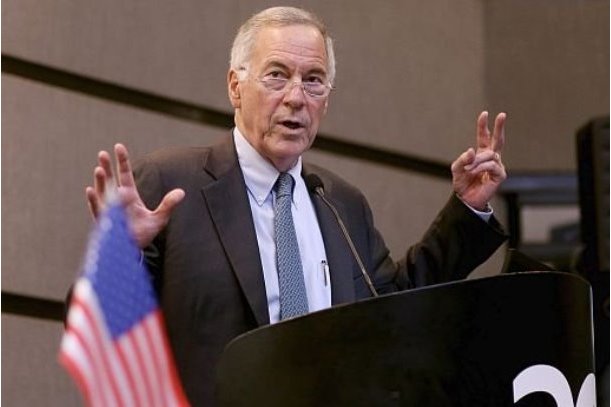‘Nigeria’s new forex policy is dead on arrival without strong rule of law and disciple’

Feature Highlight
The weakness of the naira won't end anytime soon unless there is a currency reform by way of installing a currency board.
Professor of Applied Economics at The Johns Hopkins University, Steve H. Hanke, has said the flexible interbank foreign exchange market recently introduced by Central Bank of Nigeria (CBN) will not produce the desired result. According to him, this exchange-rate regime requires very strong rule of law and discipline, which he believes Nigerian monetary officials do not have.
In an exclusive interview with Financial Nigeria, Prof. Hanke says, "Nigeria has jumped from the frying pan into the fire. A managed floating rate will never work in Nigeria."
After several months of defending its policy not to devalue the naira, the CBN ended its naira peg to the U.S. dollar by reviving the flexible interbank foreign exchange market on Monday.
The apex bank effectively allowed the naira to float – or what analysts have called ‘managed float’ – through a single market structure in the inter-bank FX market.
The naira fell by 42 percent from N199/USD to N281.85/USD and N284.83/USD on Monday and Tuesday, respectively, as the CBN tried to clear a backlog of forex orders. However, the naira appreciated to N282.80/USD on Wednesday and also rose to N281.67/USD on Thursday at the interbank forex market.
The U.S. economist recommends that, to impose discipline in the exchange regime, Nigeria should impose a currency board system.
A currency board is a fixed exchange rate regime whereby the domestic currency base is 100 percent backed by foreign reserves. In other words, there is full convertibility of a local currency into a reserve one at a fixed exchange rate. The system requires long-term commitment and discipline. Some of the advantages of using a currency board include low inflation and lower interest rates. The Economist argues that a currency board offers the prospect of a stable exchange rate, which can promote both trade and investment.
The Hong Kong dollar (HKD) is linked to the USD via a currency board. The HKD has been officially fixed at 7.8 HKD per one U.S. dollar since the currency board was introduced in 1983.
Hanke, a Senior Fellow at the Cato Institute in Washington, D.C., said he set up currency board system in Estonia (1992), Lithuania (1994), Bulgaria (1997), and Bosnia-Herzegovina (1998). In his opinion, those currency boards worked to impose discipline and stability.
Hanke says the weakness of the naira will not end anytime soon unless there is a currency reform by way of installing a currency board. He says this is also the solution for inflation.
According to him, there is a large discrepancy between Nigeria's official inflation figure of 15.6 percent for May 2015 and his calculations using the lie coefficient.
Prof. Hanke and his colleagues developed lie coefficients during the Soviet era, to approximate the real inflation because "Soviet statistics were simply the product of the Soviets’ imagination," according to the U.S. economist. The formula is: (official data) X (lie coefficient) = real estimate.
By applying Nigeria's lie coefficient, which he says is currently 4.1, to the official data, Hanke says the implied inflation rate for Nigeria in May was 63.9 percent. The coefficient is derived by using changes in the black market exchange rate data and applying the Purchasing Power Parity Theory.
Prof. Hanke says there are many reasons Nigeria’s economic data is roundly negative, including rising inflation. He says one of the reasons is low oil prices. Nevertheless, Hanke maintains that the exchange rate system is still a major problem.
“The killer is the currency regimes – both the old and the new one. There is no stability, and while stability might not be everything, everything is nothing without stability,” says Hanke, who also directs the Troubled Currencies Project, joint initiative of the Cato Institute and Johns Hopkins University.
Prof. Hanke has participated and helped to tackle hyperinflation in 21 countries including Argentina, Azerbaijan, Belarus, Bulgaria, Estonia, Georgia, Lithuania and Russia.
Other Features
-
Analysis of CBN’s new regulations on cash management and dual ...
By revising cash policies and mandating dual connectivity for payment terminals, the Central Bank of Nigeria seeks to ...
-
Africa’s crypto investment market: where growth may emerge next
Africa’s crypto investment market: where the next growth coould explode.
-
Lessons from the 2025 Goalkeepers Report: What kind of innovation ...
The 2025 report issues a clear call to action for policymakers and engaged citizens.
-
Profit: The most powerful engine for scaling impact, dignity, and ...
The most prosperous countries in the world are not those with the most aid programmes. They are those with the most ...
-
Expect turbulent asset markets in 2026
The negative impact of Trump’s tariff and immigration policies will be felt more acutely in 2026.
-
The scars of partition
Contrary to his rosy assurances, partitions often result in tragedy, as borders drawn by cartographers rarely align ...
-
Best site to sell Bitcoin in Nigeria (Fast BTC to Naira in 2026)
Apexpay stands out because it focuses on what Nigerian users actually want: speed, good rates, and simplicity.
-
The quiet influence of securitisation in financing Africa's energy ...
The scale of Africa’s energy transition demands financial solutions that are modern, secure, and scalable.
-
Lean carbon, just power
Why a small, temporary rise in African carbon emissions is justified to reach the continent’s urgent ...
Most Popular News
- NDIC pledges support towards financial system stability
- Artificial intelligence can help to reduce youth unemployment in Africa – ...
- Pan-African nonprofit appoints Newman as Advisory and Executive Boards Chair
- Abebe Aemro Selassie to retire as Director of African Department at IMF
- FRC Chairman commends NDIC for prompt remittance of operating surplus
- Dollar slumps as Fed independence comes under fire















